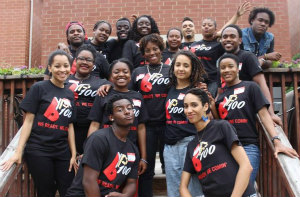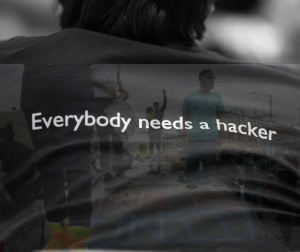A few weeks ago I came across an interesting article in Slate – Hack Away, Kid by Joe Gervais. In the article, he recounted the period during his teenage years when a few attentive educators were able to see his gift (dexterity with computer programming languages), even though he was using that gift in a disruptive manner (creating malware on the school’s computers). Gervais stands up for students who are not content to sit quietly, color between the lines, and blindly follow all of the rules the adults in their lives have given.
We have a similar situation in American society. We are seeing more young people who are not content to simply consume the goods we advertise to them, or to quietly watch the entertainment we present to them, or to absorb the substances we distribute to them. More young people have identified glitches in our society’s operating system…flaws in our cultural code that slow down our performance, kill our battery life, and lead to unexpected system crashes.

Gervais’s critique is directed towards those in positions of formal authority and responsibility in our nation’s schools. But it takes a village…to breed hackers…or to raise hacktivists.
The term hacktivists generally refers to people who use computer technology (hacking) in order to advance a political or social agenda. For the purposes of this post, I would like to expand this definition by defining “social hacktivists” as people who use their cultural, social, mental, and emotional intelligence to identify and expose breaches in the society’s structure. Social hacktivists use creative means to call the public’s attention to dangers posed by breaches that have been under-addressed by the society’s leaders. Social hacktivists seek and build communities of trust with people of good will and good sense to create and promote tangible solutions rooted in justice and empowerment for the society’s citizens.
With this working definition, I leave you with some powerful excerpts from Joe Gervais’s article, and some powerful images from the emerging generation of social hacktivists in the U.S.
“At the very same time that we are constantly hearing about the need for talented hackers in industry and government, young computer security enthusiasts are perceived as hoodie-wearing miscreants who must be stopped. The cognitive dissonance is deafening.”

“To hack simply meant to understand systems at a deeper level and make them behave in unintended ways…a person who understands the systems and tries to break them, with good or ill intent, or simply to see if it can be done.”

“The hacker personality is characterized by curiosity about and passion for technology, persistence, technical prowess, and novel ways of viewing problems. Any parent, teacher, or school should be proud of those traits in a student. Unfortunately, aspiring hackers are typically greeted with anything but pride and encouragement.”

“We’ve created an atmosphere in which promising hackers are actively discouraged from learning and therefore are likely to end up on their own without any guidance to keep them out of trouble.”

“Two teachers ran the school’s computer lab. One didn’t know what to do with us and didn’t like that fact at all…The other teacher saw us as a resource and would appreciatively ask for and accept our help around the lab. She also encouraged us to ‘keep on doing whatever it is you’re doing.’ “

“After several visits, the principal had the foresight to try something different. Rather than discourage or punish me, she created a ‘special studies’ course just for me. I was given the task of writing software for the school—secure software. For the first time I wasn’t subverting systems and controls; I was instead focused on how to design and implement a system that could keep me out.”

Do we have the foresight to try something different?
– Day G.
Host, Class of Hope & Change
